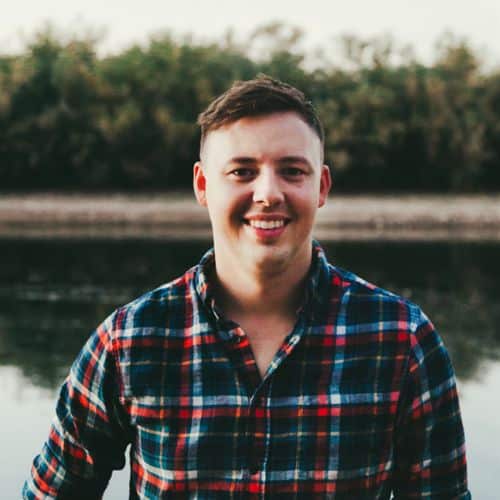Contents
Hello! Who are you?
Hey there! I’m Keaton Smith, and I’m currently living in York, Maine, United States. It’s a small coastal town, far from my childhood state of Arizona.
I’m a serial entrepreneur and I freelance in the business management sector. I’m involved in a bunch of different roles like leading M&A deals, managing operations, and providing strategic advice.
I’ve gained and lost a lot of money over the years. The excitement is awesome, but it can be desperately chaotic.
I’m 30 years old and married with 3 kids (10 and 8 year old girls and a 6 year old boy). We’ve got a sweet elderly dog named Sadie who’s been with us through every kid. My family gets my everything and one of my most important roles is to take good care of them.

I’m all about compassion in business. The business world can really suck. Having walked through both poverty and luxury, minimum wages and hundreds per hour, I see the stress work causes people.
Right now, I’m pretty happy, but I’ve definitely had my fair share of struggles and tough moments in the past. My depression and anxiety can be really tough to beat back.
What is your struggle and when did it start?
Severe anxiety and suicidal ideation have been my biggest struggles over the years. I grew up in a sort-of rough neighborhood with drug-addict parents so I wasn’t prepared well for life’s bigger setbacks.
I’d say my struggles were a slow build. Right after I turned 10 my mom got sent to the hospital and was bedridden for the next 12 years. She got addicted to prescription drugs and eventually died before my third kid was born. My dad died from a fentanyl overdose a year and a half later.
That sent me through a pretty brutal grief spiral that I’m just now getting out of. Depression hit me hard for years and it was hard to think straight for a while.
My struggles with suicide started a few years ago when I jumped into the world of private equity and acquired a couple of businesses. I felt on top of the world and like my family wouldn’t need to worry about having enough money to pay bills anymore.
Within a year, though, I watched most of my business crumble, and I found myself drowning in debt and barely able to pay rent. That’s when my mental health took a nosedive, and I began dealing with severe anxiety and suicidal thoughts. I spent most nights laying awake trying to figure out how to get us out of this situation.
I wouldn’t have been as worried if I didn’t have a family of 5 to feed.
How did this struggle make you feel at your worst moments?
At my lowest, I found myself pounding on the wall of my shower, crying my heart out, convinced that my wife and kids would be better off if I killed myself.
I had put them through enough stress over the years with my risky business ventures. My life insurance policy would take care of them better than I could.
I was so tired, and the thought of an easy solution for my family was so relieving that it terrified me.
I wasn’t as concerned for myself as for my family. It’s extremely important to me that my close people feel loved and cared for. So dragging them on the poverty-ridden entrepreneurship journey I felt like a complete failure.
My happiness was just gone and my mental health really suffered under the weight of my professional failures.
I tried my best to hide my struggles from the people around me—I didn’t want anyone to see me as weak or incapable. I didn’t even let my wife see how bad I was most of the time. My thinking was that I needed to present a strong facade so that everyone else would feel confident enough to keep going.
👉 Share your story: Help thousands of people around the world by sharing your own story. We would love to publish your interview and have a positive impact on the world together. Learn more here.
Was there a moment when you started to turn things around?
Things actually started to change for the better that super dark night I was sobbing in the shower. My wife happened to check on me as I was crying.
Imagine her shock, walking in to find me sobbing and utterly broken. I confided in her that I was contemplating suicide, mainly to spare them the worry about when our next groceries would come.
Despite being exhausted herself, my wife displayed incredible bravery by confronting the darkness with me and urging me to take a break.
She spent the entire night reassuring me that she would prefer homelessness over a life without me. That our children would rather face hunger than lose their father.
Her compassion and encouragement got me through that night. I think it was the first time that I started to be truly vulnerable and let people into my struggling heart.
That was the point I hit rock bottom and started to kick off that bottom.
That turning point was possible because of the already trusting and communicative relationship with my wife that I made it through that night and started to turn things around. I had spent over a decade trying to keep my depression and anxiety at bay. It wasn’t until I really opened up in vulnerability that I was able to begin the process of recovering.
What steps did you take to overcome your struggle?
I tried pretty much every method I could to keep myself from falling deeper into that headspace. Walks, anti-depressants (Sertraline, then Lexapro), self-affirmations, Tai Chi, breath work, whatever I was told would help.

But relying on my own mental strength is what broke me before, so I wanted some way to embrace the beautiful support I got from my loved ones.
I texted my closest friends asking for a little encouragement to help fight my negative thoughts. My idea was to have a little collection of love from my support system that I could pull out when things got dark.
They answered me with over 20 minutes of audio of them telling me they believed in me, they loved me, and they were hopeful for me. It brought me to tears, this time happy tears.
These are people I’d spent years fostering close relationships with. They’re honest, loving, and kind. They’re amazing and I owe so much of my recovery to my close people.
I started to really internalize that for years I had been exhausting myself, relying on sheer grit to get by. I was told that making others deal with my problems was immature, but I never understood that I could still rely on the people I love to help make me stronger.
At least 85% of my recovery has been because of the incredible people in my life who, through my vulnerability and trust, have been able to support me through really dark times.
The other 15% have been choosing to be hopeful and acting on that hope by pursuing self-care. That’s the little wins every once in a while of some exercise, rest, deep breathing, that sort of thing. It takes work to recover, but my support made it possible.
If you find yourself in a similar spot, please reach out to your support system, be open about your struggles, and don’t hesitate to seek professional help if you need it.
I know not everyone has the benefit of a close group of compassionate connections. But I highly encourage working on building healthy, non-toxic relationships that can help build a support network for you.
Have you shared any of this with people around you in real life?
At first, I had a really hard time sharing my struggles with my friends, family, and colleagues. But once I opened up to my closest friends, I felt more confident talking about my mental health with others.
I started opening up about it to other entrepreneurs and found out how wildly common serious mental health struggles are in the industry.

I still struggle sometimes with being vulnerable about it. Mostly because as a business professional, broadcasting my failures isn’t what employers and clients want to see. They want to see the pristine facade that makes me look like a great candidate.
After sharing my struggles with others, though, I understand that a lot of other people struggle with the same thing. In some cases, being vulnerable with them is literally life-or-death for someone struggling with the same things.
I ended up doing a TEDx talk about it in my town. Definitely one of the harder speeches I’ve done. I almost cried on stage. So I guess I’m comfortable enough to share to that extent, but it’s still scary.
If you could give a single piece of advice to someone else that struggles, what would that be?
Build compassionate and vulnerable relationships.
Don’t be afraid to ask for help and lean on the people who care about you. Remember, being vulnerable isn’t a weakness—it’s a sign of strength and courage.
There are wolves in sheep’s clothing that will hurt you. I’ve experienced that, and it sucks. I haven’t been a perfect friend to people either. I can suck, too.
But there are people out there willing to sit with you in your screw-ups, forgive you, and love you. When you’re healthy enough, you can do the same for others.
And, the US hotline for suicide is 988, just dial it on your phone and get help if you need it urgently. There is ALWAYS hope.
If there’s anything I’d love for you to know, it’s that you’re not alone. Anxiety is brutal, sometimes fatally so. But there are people who want to be there to support you. Even if you haven’t found them yet, they’re there.
Worrying means you suffer twice.
Have hope.
What have been the most influential books, podcasts, YouTube channels, or other resources for you?
- Anything by Brené Brown: Brené is a powerful voice for compassion, vulnerability, and healthy relationships. Pretty much anything she does is healing and gives great actionable advice on building connections.
- The Man Enough podcast: Justin Baldoni, Liz Plank, and Jamey Heath do an incredible job of deconstructing what it means to be “manly” and identifying ways to heal yourself and others. Beneficial for any gender as it primarily speaks on compassion, forgiveness, and recovery.
- Anything by Terry Crews: I’m a huge fan of his radical vulnerability. He’s a beautiful example of someone who had it rough, was rough, and is now a source of healing for people around him.
- The Confident Mind by Dr. Nate Zinsser: I’ve yet to find a more actionable and analytical resource on building confidence to fight back anxiety in times of stress. So many great tactics to stay sane in a discouraging world.
Where can we go to learn more about you?
First, if you relate to anything I mentioned, I’m here to help. Please feel free to reach out via my website or you can reach me on LinkedIn or TikTok.
I also go into a little more detail in my TEDx talk if you’re interested.
Want more interviews?
Continue reading our inspiring case studies and learn how to overcome mental health struggles in a positive way!
Want to help others with your story? We would love to publish your interview and have a positive impact on the world together. Learn more here.

